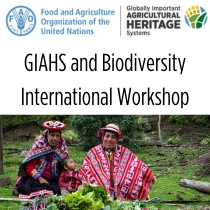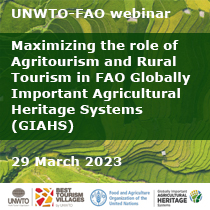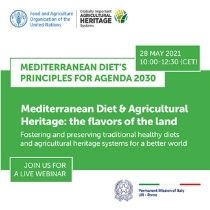- Dates: 25 et 26 avril 2024
Objectif:
- Le webinaire invitera quatre sites SIPAM où des pratiques agricoles visant à promouvoir une production agricole et une chaîne d'approvisionnement durables sont appliquées depuis longtemps sur la base de connaissances et de pratiques traditionnelles, et permettra d'échanger des informations et des expériences.
Date: 13 - 15 December 2023
Find out more on the webpage.
The webinar was focus on:
- Identify and analyze effective approaches and measures which can assure a balance between agricultural production and agrobiodiversity conservation, highlighting the collaboration among all local stakeholders, and with the support of diverse activities and their synergetic effects; and
- Discuss the conditions, challenges and key factors for achieving the successful conservation of agrobiodiversity in GIAHS sites.
Webinar: Maximizing the role of Agritourism and Rural Tourism in FAO Globally Important Agricultural Heritage Systems
Date: 29 March 2023
Time: 1030 - 1230 (CET)
The webinar will highlighted:
- FAO and the World Tourism Organization of the United Nations (UNWTO) collaboration
- Current state, practical aspects, issues and challenges of agritourism and rural tourism
- How to maximize the role of tourism in rural areas
- Best Tourism Villages (BTV) case studies as examples for GIAHS including the BTV Puqueldón village in the GIAHS site Chiloé Agriculture, Chile and the BTV Dazhai village in the GIAHS site Rice Terraces in Southern Mountainous and Hilly areas, China
On 27 October 2022, the Globally Important Agricultural Heritage Systems (GIAHS) Programme celebrated its 20th anniversary. The all-day event was held virtually and attended by Ministers, Ambassadors, Senior Representatives, Scientific Advisory Board members, GIAHS technical experts and the general public. Attendees had the chance to learn more about the prominent features of traditional agricultural systems and the importance to safeguard them. During the celebrations high-level speakers and technical experts acknowledge the achievements of the GIAHS Programme within the last 20 years.
This year´s International Symposium will be organized in a hybrid style to focus on more concrete activities of family famers in GIAHS sites to promote marketing of their agricultural products from GIAHS sites through various methods and approaches (e.g., labelling or certification systems, exploration of new supply chain, new demand, niche market, etc.) and discuss their impacts as well as the issues and challenges faced by small-scale and family farmers to initiate and achieve successful outcomes of such market promotion activities.
The approach of the Alliance for the Mediterranean Diet has potential common goals with those of the FAO- Globally Important Agricultural Heritage Systems Programme in achieving sustainable agriculture and food systems which reduce the impact on the environment, conserve biodiversity, landscapes, cultures and traditional knowledge.
The approach of the Alliance for the Mediterranean Diet has potential common goals with those of the FAO- Globally Important Agricultural Heritage Systems Programme in achieving sustainable agriculture and food systems which reduce the impact on the environment, conserve biodiversity, landscapes, cultures and traditional knowledge.
Des représentants des SIPAM de Chine, du Japon, du Pérou , du Maroc , d' Espagne et de Tanzanie ont partagé leurs expériences et les défis de leurs systèmes agri-alimentaires au cours du webinaire international Systèmes Ingénieux du Patrimoine Agricole Mondial et restauration des écosystèmes .
Consciente de l'importance de maintenir en vie et en bonne santé les écosystèmes de notre planète, l'Organisation pour l’Alimentation et l’Agriculture a organisé via le Secrétariat des Systèmes Ingénieux du Patrimoine Agricole Mondial (SIPAM) un séminaire dans le cadre de la Décennie des Nations unies pour la restauration des écosystèmes.
This webinar jointly organized by the United Nations University Institute for the Advanced Study of Sustainability Operating Unit Ishikawa Kanazawa (UNU-IAS OUIK) and the Food and Agriculture of the United Nations (FAO) shared the challenges faced by GIAHS communities in managing the impacts of COVID-19, as well as a discussion on the resiliency of GIAHS in such a crisis and the opportunities for recovery and building back better from COVID-19.
This first webinar will be an opportunity for FAO to provideinsights on Nature-Based Solutions in Agriculture with real and time- tested examples coming from Globally Important Agricultural Heritage Systems (GIAHS). The objective of the webinar is to also open a debate on the potentialities of Nature-Based Solutions that can support the agri-food systems of the countries.











